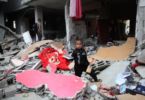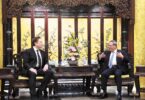The global media has reported an interesting story that the war on Gaza has granted Tunisia a rare moment of political unity, fuelling leaders’ appetite for new legislation that risks fracturing civil society groups, potentially isolating the country on the international scene. According to details, Israel’s relentless bombing of the Gaza Strip in the aftermath of Hamas action on October 7, has tugged at deep historical threads within Tunisian society, drawing all factions together in a way that nothing else could have done so, including the 2011 revolution in the North African Mediterranean nation. The deep public anger against Israel and its Western backers have given new momentum to existing proposals of the ruling Kias regime to curtail the work of the NGOs in its country.
A group of Tunisian parliamentarians put forward the proposals to rewrite the post-revolutionary Decree 88, the legislation that deals with the registration and operation of free associations, non-governmental and charity organizations. Apparently, the ruling elite considers the prevailing anti-west sentiments conducive to stricken the free space for civil society, the INGOs, Political and human rights activists that was otherwise difficult for the authoritarian regime.
Tunisia, a lone democracy of the Arab world, has been in the global radar after President Kais Saeed ousted the elected government of Prime Minister Najila Romdhane, suspended parliament, and assumed executive authority in July 2021. President Kais took multiple controversial steps including terminating the Supreme Judicial Council, ousting judges, and putting his political opponents behind the bars on the charges of treason/ sedition in an attempt to consolidate his rule in the country. President Kais organized a nationwide referendum on July 25th to get a stamp from the public on his unconstitutional and undemocratic actions, but the totalitarian rulers faced stern opposition from the civil society, political opponents, and western bloc.
Due to reasons, the Despot and his aidies started considering the INGOs, a symbol of western influence and the real reason behind anti-government activities in their nation. Although, the Kais regime did nothing in support of poor Palestinians amid the ongoing war and serious humanitarian crisis in Gaza but moved to avail this opportunity to accomplish its long held manifesto against the INGOs and Civil Society. In fact, such legacies are not uncommon, as the leaders’ neither have a religion, nor they owe a relation, emotions, or belief; the government, power and rule are the only ritual, and relatives, that only matter to them.







